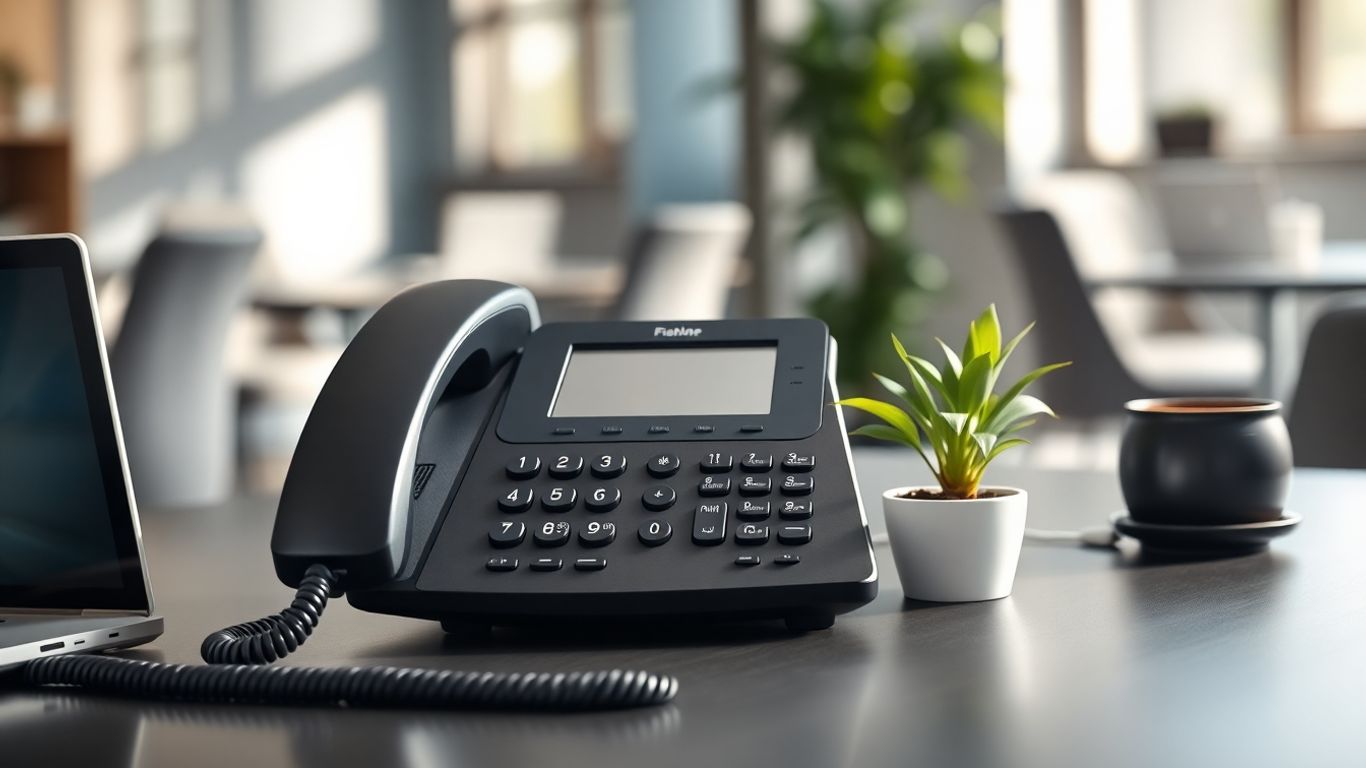Finding the right phone system for your small business can feel like a puzzle. You need something that handles calls professionally, even when you're swamped. That's where a landline phone with auto attendant comes in. It's like having an extra pair of hands, or a receptionist who never sleeps, greeting your callers and directing them. We looked at some of the top options out there for 2025 to help you figure out which one might be the best fit for your company.
Okay, so let's talk about My AI Front Desk. This isn't your grandma's answering machine, folks. We're looking at a virtual receptionist powered by AI that can actually handle customer interactions pretty darn well. It's designed to answer company-specific questions, schedule appointments, and respond to people via phone or text, pretty much just like a human would.
Think about it: you're running a small business, maybe a boutique shop or a local service provider. Calls come in after hours, or maybe you're just swamped. Instead of a generic "leave a message" prompt, My AI Front Desk steps in. It can pull information from a knowledge base you set up, so it knows your hours, your services, maybe even your return policy. It's pretty neat how it can handle complex questions without you having to lift a finger.
One of the standout things is how fast you can get it up and running. We're talking minutes, not days. You tell it about your business, make a payment, and then you can start forwarding calls to it. It's also got this crazy Zapier integration that connects to over 9,000 apps. That means your AI receptionist isn't just answering calls; it's actually doing stuff, like updating your CRM or creating tasks automatically when a call ends. It's like having a super-efficient assistant who never sleeps.
Here's a quick rundown of what it can do:
The setup process is surprisingly straightforward. You provide the AI with the necessary details about your business, and it's ready to go. This makes it a really accessible option for small businesses that don't have a dedicated IT department or a lot of time to fiddle with complicated systems. It's all about making things easier so you can focus on, you know, running your actual business.
They also offer features like setting maximum receptionist minutes, which is great for cost control, and smart voicemail that transcribes messages for you. It's a solid option if you're looking to automate your front-line communication without breaking the bank. You can even try it out for free for 7 days, which is always a good sign. It's definitely worth checking out if you want to give your business a more professional and always-on feel. You can find out more about how it integrates with other tools by looking at how it connects.
RingEX, which used to be known as RingCentral MVP, is a pretty solid option if your business is all about teamwork and staying connected. It's a cloud-based phone system that bundles in messaging, video calls, and all that VoIP stuff. What really stands out is how it tries to keep everyone in the loop, whether they're inside the company or outside partners. They've got these interactive spaces that are supposed to make collaboration easier.
When you're using the desktop app, it feels pretty familiar, kind of like Slack, which is nice. You can chat, share files, and jump into video meetings without too much fuss. They also have this AI Assistant that can summarize calls and meetings, which is handy for catching up on what was said or figuring out who needs to do what. It even helps assign tasks or schedule follow-ups right from the chat. This makes it a good choice for teams that need to work together closely, even if they aren't in the same office.
Here's a quick look at what you get with their plans:
One thing to keep in mind is that their SMS limits can be a bit tight, so if your business sends a lot of texts, you might hit that cap faster than you expect. Also, while the basic calling and chat are easy, digging into the advanced analytics and call monitoring features can take a bit of getting used to. It's a powerful system, but there's a learning curve for some of the deeper functions. If you're looking for a system that really focuses on keeping your team connected and productive, RingEX is definitely worth a look. You can check out their AI chatbot features to see how they handle visitor engagement, which is a different but related aspect of business communication.
Ooma Office is a solid choice for small businesses looking for a phone system that's pretty straightforward to get up and running. Seriously, they say it can be set up in minutes, not hours, which is a big deal when you're busy running a company.
They've got a few different plans, which is nice because you can pick what fits your budget and needs. The basic Essentials plan starts at $19.95 per user per month and includes things like unlimited calling, ring groups, and a virtual receptionist. If you need more, the Pro plan adds video conferencing and desktop apps for $24.95, and the Pro Plus plan at $29.95 throws in call queues and CRM integrations. It's worth noting that some of the cooler integrations, like with QuickBooks or Square, are only on that top-tier plan.
One thing to keep in mind is that Ooma doesn't let you mix and match plans within your account, so everyone on your team has to be on the same plan. Also, while they offer SMS texting, the limits might be a bit lower than some other services out there, so if your business relies heavily on texting, it's something to check out.
Ooma Office really shines in its ease of use for administrators. Setting up business hours, call handling, and managing the auto-attendant is done through a clean interface that doesn't make you feel like you need a degree in computer science. This makes it a great option if you want to get things configured quickly and correctly without a lot of hassle.
Overall, Ooma Office seems like a reliable system that grows with your business, especially if you value simplicity and a good set of core features without getting too complicated.
Vonage offers a pretty flexible system, especially if you like to pick and choose features. They have a few different plans, and you can add on things like call recording or even more advanced auto-attendant options if you need them. This a la carte approach can be good because you're not paying for stuff you won't use, but it can also get pricey if you end up needing a lot of those add-ons.
Their basic plan is a good starting point, giving you the essentials like unlimited domestic calling, texting, and a virtual receptionist. If you need more, like video conferencing or call recording, you'll likely have to jump to their Premium or Advanced plans, which definitely cost more. It's worth looking at the pricing carefully to see what's included in each tier.
Here's a quick look at their plan structure:
One thing that stands out with Vonage is their unlimited texting within the US and Canada. That's a big plus if your business relies heavily on SMS communication. They also have a good selection of virtual phone numbers, both local and toll-free, from various countries.
While Vonage provides a solid foundation for business communication, some of the more advanced features, like multi-level auto attendants or call recording, are often bundled into higher-tier plans or available as paid add-ons. This means the total cost can increase significantly depending on your specific needs, so it's important to budget accordingly.
Aircall is a pretty solid option if you're looking for a phone system that plays nice with your other business tools. It's got this neat feature called AI Assist that can actually give your agents tips in real-time while they're on a call. Imagine your agent is talking to a customer, and Aircall pops up with a suggestion to improve the conversation – pretty cool, right? They also have an AI Voice Agent that can handle inbound calls, answer common questions, and even qualify leads before a human gets involved. This can seriously cut down on your team's workload.
Setting up Aircall is usually pretty quick, which is a big plus when you just want to get things running. For sales and customer support folks, the shared inbox and contacts make it easy to work together. And if your team is in a noisy place, the noise cancellation is a lifesaver.
However, some of the really advanced AI stuff, like the AI Voice Agent, isn't included by default. You'll likely need to add it on, which can make the price jump up pretty fast. Also, their video conferencing is a bit limited, only handling up to five people, which might not be enough for some teams. The free trial is also pretty short compared to what other companies offer.
Here's a quick look at their plans:
Aircall really shines when it comes to integrating with other software. If you're already using tools like Salesforce, HubSpot, or Zendesk, Aircall can connect with over 250 of them, making your workflow much smoother. It's designed to fit into your existing setup rather than forcing you to change everything.

Zoom, a name most of us know for video meetings, has also stepped up its game in the business phone system arena with Zoom Phone. It's a pretty solid option, especially if your team is already living in the Zoom ecosystem. The big draw here is how well it plays with their other tools, like Zoom Meetings and Team Chat. You can start a whiteboard session in chat and then easily move it to a video conference, which is pretty neat.
Zoom Phone really shines when it comes to integrating communication into a single platform. They've got a few different plans, and you can mix and match them for different employees, which is a nice touch. For example, the Metered plan starts at $10 per user per month and is good for basic calling and shorter video conferences. If you need unlimited calling within the US and Canada, the Regional Unlimited plan is $15. Then there's the Pro Plus plan at $21.99 and Business Plus at $26.99, which bundle in more features like unlimited video meetings and AI tools.
One of the standout features is the Zoom AI Companion. It can summarize calls and chats, help find meeting times, and even create action items after a meeting. It's like having a little assistant working in the background. They also have some cool voicemail features, like prioritizing messages so you can see urgent ones first, and they get transcribed to text.
However, it's not all perfect. Some users have mentioned that Zoom doesn't always get top marks for customer service. Also, while it integrates with some things, it doesn't connect with as many CRMs as some other business phone systems out there. And if you're looking for super detailed, real-time analytics on call activity, you might need to look at an add-on called the Power Pack, as the basic reporting isn't as robust.
While Zoom Phone offers a familiar interface for many, its integration capabilities, particularly with a wide range of CRMs, could be broader. The AI features are a definite plus for productivity, but the customer service feedback suggests potential areas for improvement.
Nextiva really tries to be an all-in-one solution for small businesses, and for the most part, they do a pretty good job. Their platform, NextivaONE, bundles a lot of stuff together – your business phone, team chat, video conferencing, and even SMS texting, all in one place. It’s designed to be pretty user-friendly, so you don’t need to be a tech wizard to get it set up and running.
One of the standout features is their auto-attendant, which is pretty robust. You can set up multi-level menus to route calls exactly where they need to go. Plus, they’ve got features like voicemail transcription and Message Pro, which lets you manage texts more like a team inbox rather than just one-off messages.
When it comes to pricing, Nextiva has a few tiers. The Core plan starts around $15 per user per month and gets you the basics like voice, SMS, and IVR menus. If you need more call center features, the Engage plan is about $25, and the Power Suite, which has more advanced routing and IVR, is around $75. They also throw in a 7-day free trial, which is nice for testing the waters.
However, it's not all perfect. Some users have noted that Nextiva doesn't have as many third-party integrations as some of its competitors – we're talking maybe 19 integrations compared to others that offer hundreds. Also, while their mobile app is generally okay, some people have experienced delays with notifications, especially for voicemails. It can take a while for the alert to pop up, which could be a problem if you're waiting on an important message. And their video meetings, while functional, lack some of the fancier collaboration tools like breakout rooms or whiteboards that other services offer.
Nextiva aims to consolidate your business communications into a single, easy-to-use platform. While it offers a strong set of core features, including a capable auto-attendant and integrated messaging, potential users should consider the limitations in third-party integrations and occasional mobile notification delays.
Here’s a quick look at their plan structure:

Dialpad really leans into the AI side of things, which is pretty neat for businesses that want to get more out of their calls. They've trained their AI on a ton of business call data, so it's pretty good at picking up on keywords specific to your company or industry. Every recorded call gets turned into a summary with action items and a transcript you can actually search through. It's like having a super-powered assistant for your sales and customer service teams.
They offer a few different plans, and the Standard one, starting at $23 per user, is actually a pretty good deal. You get unlimited calling, visual voicemail, and even unlimited AI meetings for up to 10 people. Plus, it integrates with Google Workspace and Microsoft 365, which is handy if your team already uses those.
However, it's not all perfect. The video conferencing capacity is limited to 10 participants, which might be a problem for larger teams. Some users have also reported occasional glitches with the mobile app. While the AI features are strong, some of the more advanced tools, like Ai Assist or Playbooks, are extra costs on top of the Ai Sales Center subscriptions. So, if you're looking for a system that's heavy on AI for voice intelligence and don't mind the potential video limitations, Dialpad is definitely worth a look.

GoTo Connect is a pretty solid option if you're looking for a cloud-based phone system that can handle a lot of locations. Setting up new sites seems to be a breeze with their provisioning templates, which is a big plus if your business is spread out or plans to expand.
One of the standout features is their international calling. They support calling to over 50 countries, and on some plans, it's unlimited. That's pretty impressive if you do a lot of business overseas.
When it comes to managing calls, GoTo Connect has some neat tools. You can set up ring groups, call queues, and even use a drag-and-drop dial plan editor to build out how your calls are routed. This makes it easier to make sure calls get to the right person without too much fuss. They also have an AI receptionist add-on that can help with answering questions and setting appointments, which is a newer feature for 2025.
However, it's not all perfect. The basic plan can be a bit limiting, especially with auto attendants and ring groups – you might hit those limits pretty quickly. Also, some of the more advanced AI features for voice calls aren't included in the basic phone system plan, and you might need to move up to higher-tier plans for things like custom permissions for different departments.
Here's a quick look at what they offer:
While GoTo Connect offers a lot of flexibility for multi-site businesses and has some good AI features, it's worth checking the plan details carefully to make sure it has everything you need, especially if you're on a tighter budget or need advanced AI capabilities right out of the box. The pricing isn't always listed upfront, so you might need to contact them directly for a quote.
They also offer various IP phones you can purchase, like Cisco, Polycom, and Yealink models, if you need new hardware.

When you're looking for a phone system that can really grow with your business, 8x8 is definitely worth a look. It's not just for big corporations either; small businesses can find a lot to like here, especially if you're thinking about expanding internationally down the line. They offer direct inward dial numbers in a bunch of countries, which is pretty neat if you have remote workers or want to test out new markets.
One of the cool things is that everyone on your team, whether they're in the office, working from home, or on the go, can use the same app. It makes managing things a lot simpler for the folks in charge. Plus, they have different plans, so you can pick what fits your needs best. The X-Series plans, in particular, seem built for companies that are on an upward trajectory.
Here's a quick look at what some of the plans include:
While 8x8 has a lot going for it, especially with its global reach and feature set, it's worth noting that it can come with a higher price tag compared to some other options. It really shines if you plan on using those advanced features like international calling and call monitoring.
They also have a specific app called 8x8 Frontdesk, which is designed to help receptionists manage calls more efficiently. Think easy access to contacts, seeing who's on the line, and quick transfers. It’s all about making that first point of contact as smooth as possible.
Our 8x8 service is designed to handle all your calls, 24/7. Imagine never missing a customer again! We make sure every caller is heard and helped, whether it's day or night. Ready to see how we can help your business grow? Visit our website to learn more and get started!
So, that's the lowdown on finding the right landline phone with an auto attendant for your small business. It’s not just about picking a phone; it’s about making sure your business sounds professional and handles calls smoothly, even when you can't. We looked at a bunch of options, and honestly, the tech out there now is pretty wild. Think AI that sounds like a real person, systems that connect to all your other tools, and ways to manage calls that just make sense. Picking the right one means your customers get a good first impression, and your team can focus on what they do best. Don't overthink it too much – find something that fits your budget and makes your day-to-day a little easier. It’s a small change that can really make a difference.
Think of an AI receptionist as a super-smart virtual assistant for your phone. It can answer common questions your customers might have, book appointments for you, and even send text messages, all day and all night. It's like having a dedicated helper who never sleeps, making sure your customers always get a response, even when you're busy or closed.
Not at all! Setting up an AI receptionist is surprisingly quick. You can usually get it up and running in just a few minutes. You just need to tell it about your business, and it's ready to start taking calls and answering questions.
Yes, these AI systems are designed to understand and answer a wide range of questions about your business. They use advanced technology to learn from the information you give them, so they can provide accurate answers just like a human would.
Some AI systems let you set limits on how much they can work, like a maximum number of minutes per day or week. If the limit is reached, you can choose what happens next, such as sending the caller to your voicemail or forwarding the call to a team member.
It's pretty neat! The AI can take messages for you and then automatically turn them into text. This makes it super easy to quickly read your voicemails instead of listening to each one. You'll also get notified right away when a new message comes in.
Absolutely! Many AI receptionist services can connect with lots of other apps you might already use, like your calendar or customer management software. This means information can be shared automatically, saving you time and making sure everything stays in sync.
Many services offer a free trial period, often for a week or two. This is a great way to test out the features and see how well it works for your specific business needs before committing to a plan.
An AI receptionist can handle a lot of the routine tasks, freeing up your human staff for more complex issues or personal customer interactions. For many small businesses, an AI receptionist can significantly reduce the need for a full-time human receptionist, or act as a helpful first point of contact.
Start your free trial for My AI Front Desk today, it takes minutes to setup!








